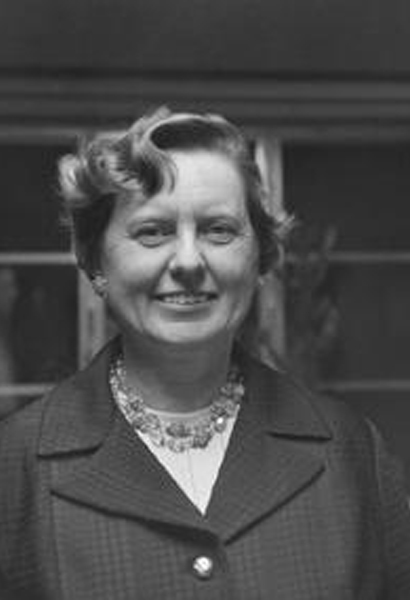

Birth: March 11, 1925
Death: February 5, 1983
Specialty: Chemistry
Major Contributions:
Founder of Bioinformatics
Wrote Atlas of Protein Sequence and Structure
Developed one letter code for amino acids
Margaret Oakley Dayhoff has been called the “mother and father of bioinformatics” as she was a pioneer of applying mathematics and computational methods to biochemistry.
Educated as a physical chemist, she had computers complete her data analysis of theoretical chemistry, using punch card machines to calculate the resonance energies of several polycyclic organic molecules. She completed this work as part of her doctoral thesis at Columbia University, following this up with post-doctoral research at the Rockefeller Institute and the University of Maryland.
In 1960 she joined the National Biomedical Research Foundation and shortly thereafter began developing tools to aid protein chemists in determination of amino acid sequences by automatically overlapping the sequences of peptides. Seeing the need for a database of nucleic acids she began collecting protein sequences in the Atlas of Protein Sequence and Structure, publishing the book in 1965 which was followed by several republished editions.
The Atlas was organized by gene families, Dayhoff was a pioneer in their recognition. She also developed the first on-line database system, a sequence database, that could be accessed by telephone line for use by remote computers in 1980. In an attempt to reduce the size of data files used by sequencing she developed a one-letter code for amino acids that was accepted by the International Union of Pure and Applied Chemists.
As part of her work with amino acids she originated one of the first substitution matrices, Point Accepted Mutations, which is the replacement of a single amino acid in the primary structure of a protein with another single amino acid, accepted by the process of natural selection.
As an active member of the Biophysical Society, she served as the first female officer of the group, including as president. Because of her work in bioinformatics as well as mentoring women working in scientific areas the Biophysical Society created an award in her honor that is given to a promising young woman to encourage her to enter a career in scientific research.
In 2022, her contributions in the development of the science of bioinformatics were acknowledged with a bacterium being named in her honor, Enemella dayhoffiae.
Written by Angela Goad
Sources:
Dr. Margaret Oakley Dayhoff (The Biology Project)
Wikipedia: Margaret Oakley Dayhoff
Grandma Got STEM: Margaret & Ruth Dayhoff
See Also:
Wikipedia: Point Accepted Mutation
